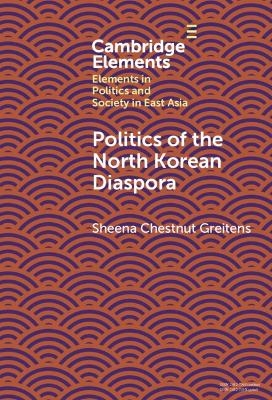
Politics of the North Korean Diaspora
Seiten
2024
Cambridge University Press (Verlag)
978-1-009-45453-7 (ISBN)
Cambridge University Press (Verlag)
978-1-009-45453-7 (ISBN)
This Element explains the origins and shape of the North Korean diaspora; examines North Koreans' participation in the democratic systems in which they settle and their relationship with North Korea's non-democratic homeland regime; and discusses how this sheds light on comparative developments in authoritarian diasporas around the world.
Politics of the North Korean Diaspora examines how authoritarian security concerns shape global diaspora politics. Empirically, it traces the recent emergence of a North Korean diaspora – a globally-dispersed population of North Korean émigrés – and argues that the non-democratic nature of the DPRK homeland regime fundamentally shapes diasporic politics. Pyongyang perceives the diaspora as a threat to regime security, and attempts to dissuade emigration, de-legitimate diasporic voices, and deter or disrupt diasporic political activity, including through extraterritorial violence and transnational repression. This, in turn, shapes the North Korean diaspora's perceptions of citizenship and patterns of diasporic political engagement: North Korean émigrés have internalized many host country norms, particularly the civil and participatory dimensions of democratic citizenship, and émigrés have played important roles in both host-country and global politics. This Element provides new empirical evidence on the North Korean diaspora; demonstrates that regime type is an important, understudied factor shaping transnational and diasporic politics; and contributes to our understanding of comparative authoritarianism's global impact.
Politics of the North Korean Diaspora examines how authoritarian security concerns shape global diaspora politics. Empirically, it traces the recent emergence of a North Korean diaspora – a globally-dispersed population of North Korean émigrés – and argues that the non-democratic nature of the DPRK homeland regime fundamentally shapes diasporic politics. Pyongyang perceives the diaspora as a threat to regime security, and attempts to dissuade emigration, de-legitimate diasporic voices, and deter or disrupt diasporic political activity, including through extraterritorial violence and transnational repression. This, in turn, shapes the North Korean diaspora's perceptions of citizenship and patterns of diasporic political engagement: North Korean émigrés have internalized many host country norms, particularly the civil and participatory dimensions of democratic citizenship, and émigrés have played important roles in both host-country and global politics. This Element provides new empirical evidence on the North Korean diaspora; demonstrates that regime type is an important, understudied factor shaping transnational and diasporic politics; and contributes to our understanding of comparative authoritarianism's global impact.
1. Introduction: North Korea's Emerging Diaspora; 2. North Korea's Diaspora Management Policies; 3. Shaping the North Korean Diaspora; 4. Citizenship & Political Belief; 5. Citizenship & Political Behavior; 6. Conclusions, Comparative Connections, & implications; References.
| Erscheinungsdatum | 09.01.2024 |
|---|---|
| Reihe/Serie | Elements in Politics and Society in East Asia |
| Zusatzinfo | Worked examples or Exercises |
| Verlagsort | Cambridge |
| Sprache | englisch |
| Themenwelt | Sozialwissenschaften ► Politik / Verwaltung ► Politische Systeme |
| Sozialwissenschaften ► Soziologie | |
| ISBN-10 | 1-009-45453-6 / 1009454536 |
| ISBN-13 | 978-1-009-45453-7 / 9781009454537 |
| Zustand | Neuware |
| Haben Sie eine Frage zum Produkt? |
Mehr entdecken
aus dem Bereich
aus dem Bereich
über Alltagsorte des sozialen Zusammenhalts
Buch | Softcover (2024)
transcript (Verlag)
CHF 33,55


